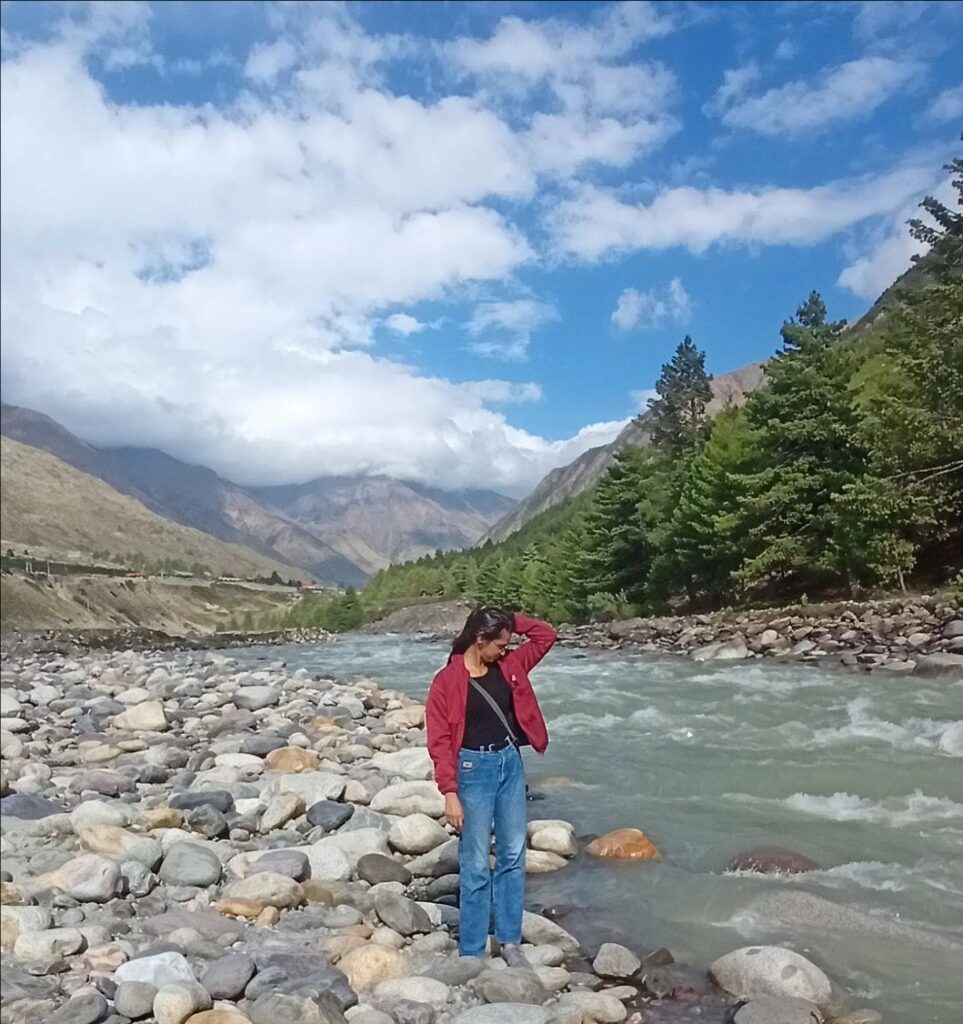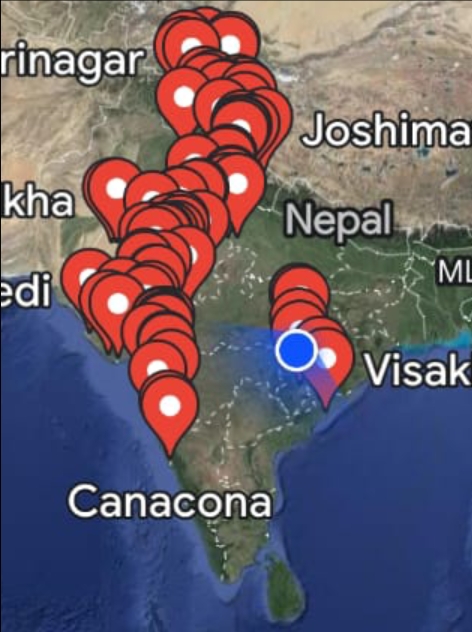Insights into the mind of a female solo traveller in India
Although solo traveling for females is gaining momentum in India, it remains a relatively new concept, often met with skepticism and questioning from others. The challenges faced by women traveling alone in India are numerous, ranging from safety concerns to societal norms. Despite these hurdles, there are brave and adventurous women who choose to embark on solo journeys across the country. The real curiosity lies in understanding what motivates them to take such bold steps when the comfort of home beckons.
As a fellow solo traveler, I found myself pondering these questions, eager to gain insights into the mindset of female solo travelers in India. Fortunately, I had the opportunity to meet Payal Agarwal, an intrepid solo traveler hailing from Kotha, Rajasthan, and currently residing in Raipur, Chhattisgarh. With her extensive experience hitchhiking across nearly half of India on a budget, Payal provided invaluable insights into the initiation, challenges, and motivations of female solo travelers.
Through our conversation, I delved into Payal’s journey, exploring how she defied stereotypes and navigated through the complexities of solo travel as a woman in India. Her experiences shed light on the psychological aspects of solo female travel, illustrating how individual upbringing and societal norms influence perceptions and decisions.
In this article, I aim to offer a deeper understanding of the psychology behind female solo travel in India, exploring the interplay between personal upbringing, societal expectations, and the innate drive for exploration and independence. By unraveling these dynamics, we can gain a greater appreciation for the resilience and determination of female solo travelers, and perhaps challenge the prevailing norms that limit their potential.
Instagram link: https://www.instagram.com/cold_nomad?igsh=MXBxZms2cm9rdHFjeA==

The clipped wings
As children, we often harbor dreams inspired by our limited exposure to various professions, whether it’s aspiring to be a doctor, engineer, astronaut, athlete, or something else entirely. These childhood aspirations are shaped by our environment and the opportunities available to us. However, the path we ultimately choose can be influenced by societal expectations and family aspirations.
Born into a typical middle-class Rajasthani family, Payal Agarwal, the eldest of three siblings, discovered her passion for the arts at a young age. Inspired by her self-taught and talented mother, Payal delved into dancing and painting during her formative years. Despite her natural inclination towards the arts, her parents had different plans for her future. Like many families in Kota, where success in entrance exams is highly coveted for admission to premier institutions, Payal’s parents were determined to steer her towards a career in medicine.
However, when Payal was only in the 9th grade, her English teacher recognized her potential and offered her a job as his assistant, with a monthly stipend of Rs. 10,000. Despite this promising opportunity, Payal’s parents were hesitant to deviate from their plans for her. Reflecting on this pivotal moment, Payal acknowledges the impact it had on her perception of her own interests and abilities. The experience left her questioning whether a career in science was truly aligned with her passions.
Despite her reservations, Payal continued her academic journey, diligently preparing for the prestigious NEET exams, the gateway to medical education in India. However, the missed opportunity to explore her artistic talents at a young age left a lasting impression on her, shaping her understanding of personal fulfillment and career aspirations.
Repercussions
While Payal obediently pursued her NEET exam preparation during her 11th and 12th grades to appease her family’s wishes, she found herself constantly yearning for escape. This desire to break free had taken root as early as 9th grade when Payal would often skip classes, opting instead to roam around on her scooty and socialize with friends. It was during this period that she formed friendships with boys and experienced her first romantic relationship.
During her intermediate years, Payal’s rebellious streak intensified as she would sneak out of her house at night to meet friends. However, her nocturnal escapades came to an abrupt halt when a vigilant security guard alerted her parents to her late-night outings. Caught red-handed, Payal faced the consequences, including the end of her relationship. Suddenly thrust into solitude, she found solace in solitary moments, often escaping to a newly constructed bridge in Kota to contemplate life instead of attending classes.
Despite the turmoil she faced, Payal’s truancy from school inadvertently led her to discover her passion for exploration. While others attended classes, she would embark on adventures, traversing to distant waterfalls and sharing these experiences with friends. These moments of freedom and discovery provided a respite from the pressures of academic life and ignited a love for travel that would shape her future endeavors.
Re-attaining the wings
Despite her tumultuous journey, Payal remained academically adept. After taking a gap year following her 12th grade, she successfully cleared her NEET exams. However, instead of pursuing counseling, her lack of enthusiasm led her to feign ignorance about her exam results, preferring to remain at home. Nonetheless, she was determined to continue her education away from home and managed to secure admission to Maharana Pratap University of Agriculture and Technology for her bachelor’s degree through the ICAR exams for agriculture, a field she hadn’t initially considered.
It was during her time at university that Payal finally had the opportunity to indulge in her true passion—traveling. From the moment she arrived on campus, she began exploring various corners of the country, venturing to places she had only dreamed of visiting before. Despite her limited pocket money of 5000 rupees per month, of which 3000 went towards room rent, she scrimped and saved to allocate the remaining 2000 rupees for her travels. Hitchhiking became her preferred mode of transportation, allowing her to stretch her limited funds as far as possible.

Although Payal was presented with a chance for a second shot at redemption when she was accepted to the Rome Business School for a Master’s in tourism, family pressure led her to forego this opportunity. Nevertheless, she eventually completed her bachelor’s degree and enrolled in the university’s master’s program. Academic life proved challenging as she struggled to adjust to the realities of university life compared to her earlier expectations. However, extracurricular involvement, and strong relationships with her professors enabled her to persevere and successfully complete her degree, albeit with considerable effort.
The challenges
Undoubtedly, one of Payal’s greatest challenges was balancing her passion for arts, literature, and travel with her parents’ expectations for her to pursue a scientific education. With limited financial support from her parents, she meticulously saved every rupee to fund her travels to remote corners of India, relying primarily on hitchhiking as her mode of transportation. Her dedication to exploration even led to her eviction from her hostel during her studies, prompting a move to a traveler’s hostel where she found solace and support from the manager, Mr. Yogesh, who became not only her lodging provider but also a close friend during challenging times.
Living on a tight budget, Payal sustained herself with homemade sandwiches and salads crafted from locally sourced vegetables. She recounted her frugal approach, recalling how she would forego purchases, such as a 300-rupee sunscreen, during her travels to northern regions, resulting in her face tanning heavily from prolonged exposure to the sun. Remarkably, she shared that a 15-day trip to Spiti cost her a mere 3,500 rupees, underscoring her resourcefulness and unwavering determination to explore without financial constraints.
To finance her adventures, Payal employed various methods, including tutoring schoolchildren and choreographing wedding events. She reminisced about her humble beginnings, tutoring a third-grade student named Prathamesh for a meager fee of 50 rupees per class. Despite her efforts to earn independently, Payal faced familial challenges, as her father’s distrust, stemming from past incidents of her associating with boys, cast a shadow over her endeavors. Recalling a particular instance when her sister urged her to disclose her travel plans to her father, Payal recounted a tumultuous 15-day period of discord and confrontation with her father, highlighting the complexities faced by female solo travelers that extend beyond the journey itself to interpersonal dynamics within their families, compounded by insecurities and lack of trust.
The landing
In yielding to her parents’ wishes, Payal embarked on a career path as a research scientist in a seed technology firm, a role esteemed by societal standards. Initially, she viewed it as an opportunity to explore and gauge her interest in the field, committing to a one-year trial period. However, instead of clarity, she found herself ensnared in a cycle of financial obligations, from purchasing a scooter to supporting her family, which diverted her attention from her previous passion for travel.
The allure of financial stability and the comforts afforded by her job gradually eroded Payal’s fervor for exploration, leaving her feeling adrift and disconnected from her true self. She lamented that her once-vibrant spirit seemed dimmed by the demands of adulthood, overshadowed by the perceived success of her younger sister, Shivani, who epitomized her parents’ ideal daughter. Despite her internal conflict, Payal continued to clandestinely pursue her artistic endeavors, choreographing wedding events in the scant moments spared from her professional responsibilities, albeit with a sense of longing for the freedom and fulfillment she once derived from her travels. Concerned about deviating from her prescribed path and potentially becoming the family’s outlier, Payal grappled with the tension between familial expectations and her own aspirations, navigating a delicate balance between conformity and self-expression.
Psychology of a female solo traveller in India
In one of our conversations, Payal candidly expressed her struggle to pinpoint the exact driving force behind her relentless pursuit of travel. She described it as a sensation of the roads moving backward while she propels forward, a visceral experience that ignites her spirit and makes her feel truly alive. Despite its abstract nature, her passion for travel seemed deeply ingrained, prompting me to delve further into her psyche.
Justification
Payal revealed that she often feels shackled by societal expectations, compelled to maintain her role as a research scientist to appease her family. This internal conflict leaves her grappling with a sense of uncertainty about her future path.
Validation
In seeking validation, Payal leans on a select few individuals whom she trusts implicitly. Close friends like Teja and Yogesh, along with her sister, serve as her pillars of support, offering reassurance and understanding in times of doubt.
Complaints
Beyond her professional obligations, Payal lamented her struggle to find a compatible life partner, citing it as a significant source of dissatisfaction in her life. Despite embodying the qualities of an ideal partner, she remains unfulfilled in her search for companionship.
Materialism
As the eldest sibling, Payal feels a weighty responsibility to provide for her family financially. Her desire to alleviate their burdens underscores her deep-rooted sense of duty and attachment to familial well-being, even at the expense of her own desires.
Reflecting on our conversation, I gained insight into the profound impact of trauma and societal expectations on the psyche of female solo travelers. Their journey extends far beyond the physical act of traveling, encompassing a complex interplay of personal aspirations, familial obligations, and societal pressures. As solitary trailblazers in a society that often fails to comprehend their unconventional paths, finding understanding and connection with like-minded individuals becomes a cherished but elusive pursuit. During my travels in Goa, I encountered another individual who shared a similar grievance about the challenge of finding the right life partner. To delve deeper into this theme, I invite you to explore the article on this page.
I am a 31 year young PhD graduate who has decided to travel the length and breadth of India on my cycle, to document the journey of meeting a vast array of people. In my journey, I intend to understand the characteristic features of the people of this nation and categorize them based on their demographics, age, profession, gender, traditions, and cultural differences.